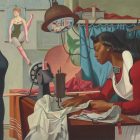Garden Journal of a Death Foretold

Some members of the Apsáalooké tribe, on whose stolen land I live, say that some stories shouldn’t be told in summer, when the land spirits are most powerful. Such stories are genies in bottles, incantations that must be saved for a winter’s night, when a spider spins and sings in the corner of the lodge and voices whisper up the chimney. Like wildfire. Like floodwaters. Only at the darkest hours of the calendar can their force be unleashed safely.
The power of winter stories is on my mind when I visit my mother in her assisted living center. Her condition follows the seasons too—debilitating drama in the hot months, rehabilitation in the cold, followed by a more devastating cycle the next year. She’s broken a hip and worked back to walking with a cane, then broken the other hip and wound up tied permanently to a walker, all in the last few years. Her mind is a visitor that keeps no regular schedule. Last summer as the primroses began to bloom in Montana, Mom got lost in the Denver airport on her way to a wedding and wandered in terror until security delivered her to my panicked sister-in-law at the arrivals doors. A year later, she doesn’t remember any of this.
The timeline is clear to me. I chronicled Mom’s crisis in my garden journal, long the province of temperature and precipitation notes, now a place to record growth and death of other kinds. A niece is born as the first maple leaves glow yellow. A son graduates from high school as tulips bloom and oaks bud. When oak buds are the size of a mouse’s ear, Apsáalooké elder Alma Hogan Snell would say, it’s time to plant corn. A mouse’s ear is so tiny. Have you noticed? Who would take the time to see such a little thing and tie it to the seasons? How altered that perspective is from the one that updates Twitter every fifteen minutes.
To garden is to notice tiny signs of hope and failing. So it is to watch an elder succumb to the diseases of aging. In the morning, Mom can be almost brisk, looking for the best way to spend her day, talking about finding a job, wanting to learn “to Facebook,” which she wasn’t able to manage in much better days. By evening, she’ll ask more than once in the same conversation, “Have I explained to you that I’m losing my mind?” and tell her favorite aide, Hunter, that I’m her mother.
My garden lies under feet of snow, grasses and sage bowed horizontal, the ancient willow dropping thick boughs. If we’ve pruned wisely, they don’t hit the roof. Rabbits nest. The hens stop laying. A child practices cello hour upon hour in the living room—Harry Potter theme songs and Suzuki minuets. Mom’s falls grow more frequent. An early melt, but this year the daffodils don’t bloom. Did I forget to fertilize them? Should I have dug the bulbs and distributed them in fresh holes? Are they simply finished? The tulips are sparser too, and I blame myself. A better gardener would see a better harvest, but I’ve been distracted. There are so many calls, every time Mom falls, until finally I ask them to email instead because how can you refuse that call at any hour?
Finally, she gets an appointment with the neurologist, who diagnoses Parkinsonism on a day when the dogwood unrolls its first leaves. The prognosis is worse than Parkinson’s—mingled with dementia, it means death within a few years. The season of renewal has failed to renew her, and now this terminal sentence. I would rather not believe in an “ism” that makes my mother shake and stumble, but believed in or not, here it is.
“Will I get better?” she asks me, not the doctor. So many doctors, with whom I talk endlessly and fruitlessly, but she knows my face. There’s only more decline, but how do I say so when she’ll forget that I came to see her but remember that I said she’s dying? I cut lilacs, so hardy they’re indifferent to my nurture, and arrange them in a vase made by my cousin that I place beside her open window where the scent won’t overwhelm. She has morning terrors, wakes not knowing where she is, and I race over in the shirt I slept in to tell her she’s okay, she’s safe.
“But how do I know that’s true?” she asks.
“Because I’m telling you, and you trust me,” I say. She nods with a child’s wide eyes.
We sit together. I show her phone games, but she needs me to press the buttons. At the coffee shop across the street, I buy her mochas that she won’t drink because the barista art is too pretty. We walk along a field of thistle, milkweed, sage. I point out fingers of morning light tickling black cottonwoods, the approaching storm clouds of evening, the rimrocks in pink sunset visible from her window. “Oh,” she says, but she looks at me, the only weather pattern she recognizes, the only thing that doesn’t disappear from her mind when she looks away.
One day soon, that’ll go, and I’ll become a stranger. I’m not ready for that either.
My father-in-law’s funeral mass fills a church called St. Bernadette’s in a small Iowa town where everyone knows who I am, and I struggle with the large cast of characters. Conversation at the church basement lunch tends toward the height of corn, the number of dairy farms failing in Wisconsin, and the colleges the children have gone off to. There’s fresh mint in the tea and homemade kolaches. Someone has made a crockpot of chicken and noodles for our Muslim relations. In the absence of the craftsman who taught my beloved husband manhood and greeted our sons as apprentices, we’re all quiet and shaky. The heat outside is a physical weight, and we’re weakened by loss.
Back in the Montana city where she was born and raised, my mother’s studio apartment near the dining room is a mess she wouldn’t have tolerated in more vigorous years, but now she needs things visible to have any hope of finding them. Through the winter, I brought box after box of her things and tried to sort through them with her, but she wanted everything—every photo, every creepy china doll, a half dozen Bibles, all her winter stories. She hoards TV remotes and Chapstick. There’s no part of life she’s willing to abandon. She clings to it fiercely as winds off the Beartooth Range carry it away pound by pound, synapse by synapse.
The garden is a riot. Tiger lilies stifling the mailbox, roses, ripe currants and raspberries, butterflies on pink milkweed blooms, three kinds of day lily, pansies in baskets, hydrangea rolling green to white, potentilla sparked with yellow, cranberries, grapes, oregano, tomatoes, heavy buds lolling on hollyhocks and Echinacea, bursting out purple. Standing on the front porch drenched in this splendor, I welcome the celebration and fear the powerful spirits that bring such life. What is most alive is also very close to death.
I retreat into the green enclosure with my chickens and pull bindweed for comfort in ratty gloves. Mom was never a gardener. I get that from Grandma Esther, the seamstress with a solid Bohemian jaw who never went to high school but could make tomatoes grow from a few seeds she spat out and cook zucchini a dozen ways. She died in a car accident at 92. Mom’s 77. It’s greedy to want more years, but I’m fiercely greedy. Mom should sit with my children on the porch as hostas wave their late summer blossom wands, watch the maples turn Crayola colors brilliant enough to give her heart for winter.
At the corner of the steps is an empty place where last year a prolific lavender bore grains so abundantly that I, slack farmer that I am, collected them for cooking and sachets. This year, there’s nothing, no shadow of the plant that gave a grand finale and exited without encore. All summer, I’ve thought of replacing it with a lush new recruit from the nursery, but that blank bit of dirt stares back, whispering that some stories must wait for winter. Instead, fallen willow leaves dry into a bed for the family of garter snakes claiming sanctuary in our yard. I hear them before I see them, the telltale rustle, then a sinuous striped line disappears among the purslane. It soothes me to think of the snakes safe, eating bugs, dozing in the sun. I’m not reconciled to the loss of the lavender, but life inhabits emptiness in just this way, a tiny shift, a quickening, before we even acknowledge the need.



